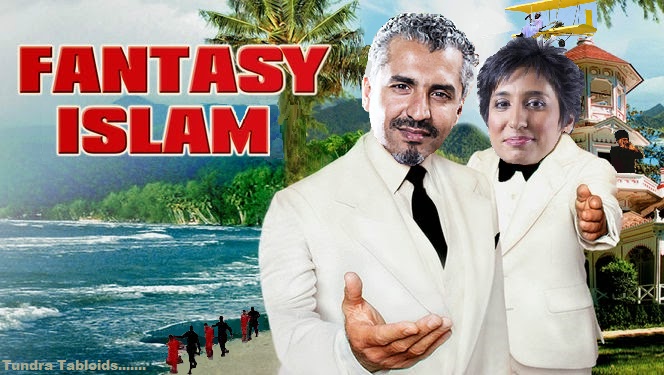There is no ‘Islamism’, there’s only Islam…
A concocted label by those unable to come to terms with the naked truth, that being, the more peaceful verses stemming from Mohamed’s time in Mecca where he and his fledgling movement were greatly outnumbered, having been abrogated by the verses from the Medina period. If you’re honest, there is no getting around this fact. There can be no ‘reform of Islam’ without ripping passages straight from the koran itself. It’s simply nopt going to happen.
THE STRANGE CASE OF MAAJID NAWAZ

First of all, let me clearly define my terms – Islamism is essentially synonymous with terrorism in my mind, because their goals are the same. Islamism is the political element of Islam which seeks to establish a global caliphate that sees everyone living under sharia. Sharia, as we know, in spite of the lies that are continually told by the Muslim darlings of the UK’s media, does not take kindly to gays, women, and people of other faiths.
Maajid Nawaz was once part of Hizb ut-Tahrir, which I consider to be a terrorist organization for the reasons given above. Hizb ut-Tahrir is banned in all Arab Muslim countries, with the exception of Yemen, the UAE, and Lebanon. It is also banned in some other countries, too: Germany, China, Russia, Egypt, Turkey, etc. Yet Hizb ut-Tahrir still holds demonstrations in Central London to this day. This is a terrorist organization that Mr. Nawaz was part of, promoted, and helped grow to its size today. Nawaz also allegedly spent time in jail because of his participation with Hizb ut-Tahrir and his other Islamist activities.
Today Maajid is the darling of the UK’s media. Apparently being an ex-member of a terrorist organization makes one an expert on how best to spread Islam peacefully across the UK. Maajid is still a fierce promoter of Islam. He is still looking to spread it worldwide, but he’s hoping that he can reform Islam and give us the soft version, the version without all the calls to violence and the need to establish a caliphate. To that I say, good luck, and, further, you can keep it, because I’m not buying into it. I do not want Islam in any of its guises.
Why are people such as Maajid Nawaz, Mo Ansar (who was involved in a controversy over an unpaid bank loan and an alleged degree in theology), and Medhi Hasan (the HuffPo and Al Jazeera journalist who is noted for having been caught on hidden camera in a mosque telling the audience that non-Muslims are “animals”), and Fiyaz Mughal of TellMama (who has twice lied about Islamophobic hate crimes in order to keep getting funded by the government, and who now advises the London Met Police’s CPS unit about what constitutes Islamophobic hate crimes, and who should be punished for them) so celebrated in the media? All four of these men have very questionable pasts.
Maajid seems to be the most intelligent of these four, and that is why I think of him as a snake-oil salesman. He claims to be a literary man, well-read, and yet he remains a practicing Muslim (so far as I am aware) and stands by the Quran. Any well-read person would surely be aware of all of the tropes that go into the compilation of a text. Texts are like machines — they have component parts and are built and structured in particular and different ways, depending on the nature of the text. The Old Testament, for example, is a wonderful example of virtually every form of literature there is. It also makes use of every kind of trope. In the Old Testament we see the use of parable, allegory, symbolism, metaphor, diary, epic, poetry, romance, genealogy, authorial intent and so forth. Students of the Bible take classes in The Bible As Literature, and with this academic study comes the linguistic task of deciphering the meaning of a disputed word (at which point the author will put a footnote as to historical context, and also include a couple of other potentially different meanings for the reader to make up his own mind). We pore over these texts in order to get at any underlying truths. We dispute the authenticity of a text, or the authenticity of the inclusion of a paragraph or sentence. We look at the literacy levels of the days in which these texts were written and of all the mistakes that the one and only semi-literate person in the village might have made when recording them. We also look at the social and political climates of the eras in which these books were written. We don’t, as Muslims generally do when they read the Quran, read them literally and without investigation.

